BSBMGT801: Development of a Knowledge Management Strategy
VerifiedAdded on 2023/06/03
|13
|3388
|459
Homework Assignment
AI Summary
This assignment delves into the development of a comprehensive knowledge management strategy, addressing critical aspects such as legal, ethical, and security issues. It examines key concepts like knowledge acquisition, creation, utilization, and transfer, alongside various knowledge management processes. The solution also explores organizational change management theories and methods, including Lewin's change management theory and the McKinsey 7 S framework. Furthermore, the assignment provides detailed answers to questions regarding the evaluation of existing knowledge management arrangements, the components of an information management system, and the methods for assessing the effectiveness of organizational procedures. The document also identifies key factors for assessing the need for improvement in an organization's strategic use of knowledge, offering a complete analysis of knowledge management principles and practices.
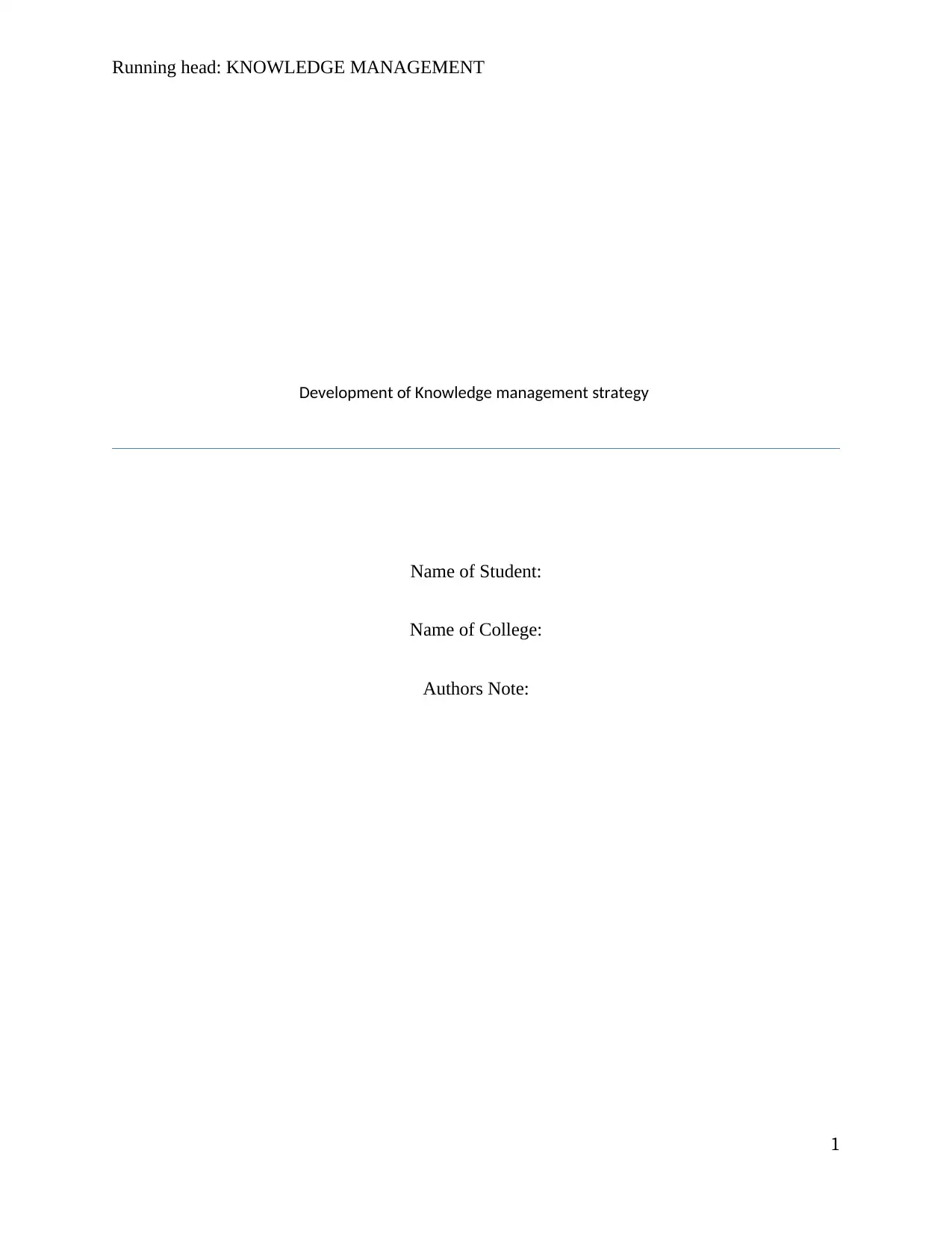
Running head: KNOWLEDGE MANAGEMENT
Development of Knowledge management strategy
Name of Student:
Name of College:
Authors Note:
1
Development of Knowledge management strategy
Name of Student:
Name of College:
Authors Note:
1
Paraphrase This Document
Need a fresh take? Get an instant paraphrase of this document with our AI Paraphraser
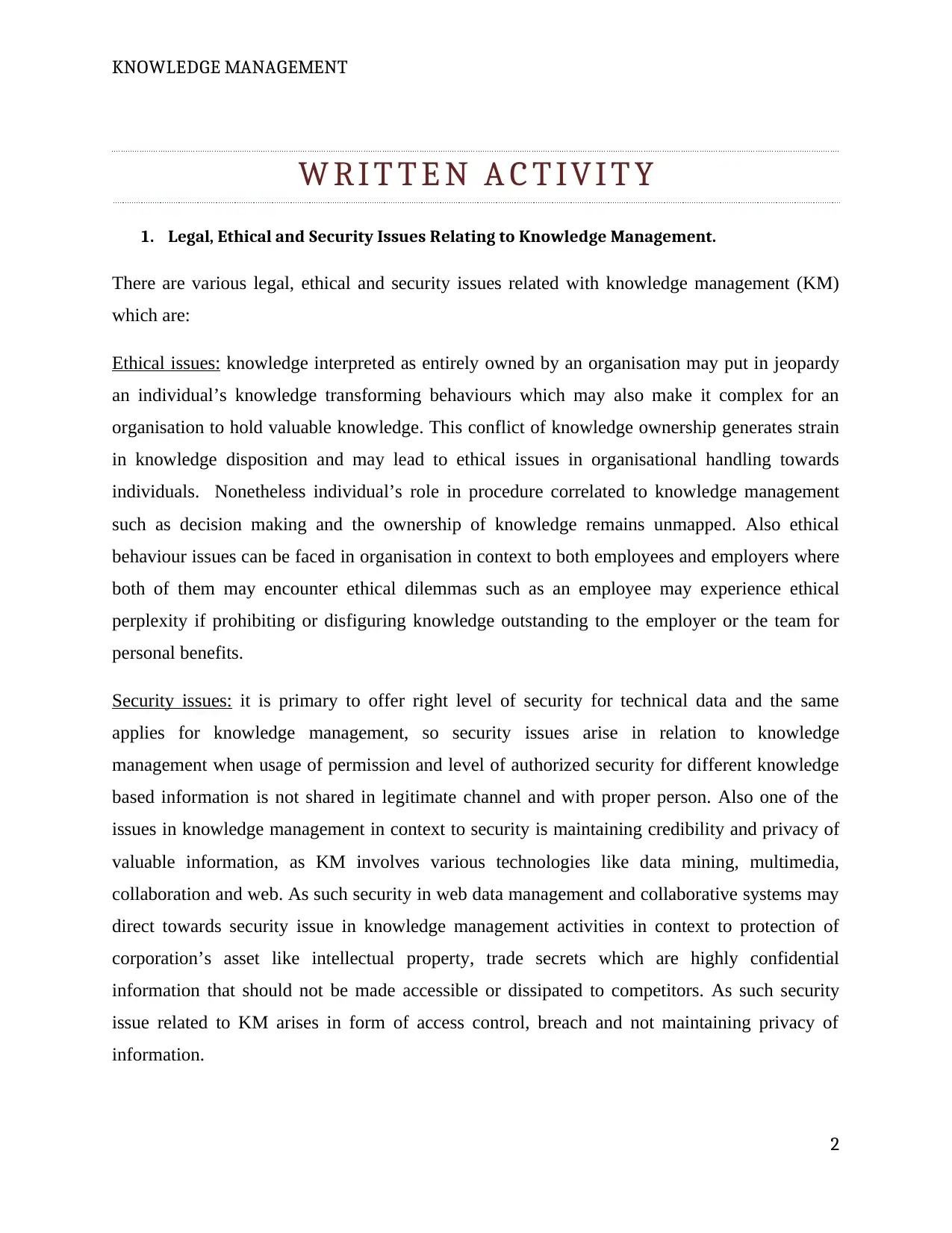
KNOWLEDGE MANAGEMENT
W R I T T E N A C T I V I T Y
1. Legal, Ethical and Security Issues Relating to Knowledge Management.
There are various legal, ethical and security issues related with knowledge management (KM)
which are:
Ethical issues: knowledge interpreted as entirely owned by an organisation may put in jeopardy
an individual’s knowledge transforming behaviours which may also make it complex for an
organisation to hold valuable knowledge. This conflict of knowledge ownership generates strain
in knowledge disposition and may lead to ethical issues in organisational handling towards
individuals. Nonetheless individual’s role in procedure correlated to knowledge management
such as decision making and the ownership of knowledge remains unmapped. Also ethical
behaviour issues can be faced in organisation in context to both employees and employers where
both of them may encounter ethical dilemmas such as an employee may experience ethical
perplexity if prohibiting or disfiguring knowledge outstanding to the employer or the team for
personal benefits.
Security issues: it is primary to offer right level of security for technical data and the same
applies for knowledge management, so security issues arise in relation to knowledge
management when usage of permission and level of authorized security for different knowledge
based information is not shared in legitimate channel and with proper person. Also one of the
issues in knowledge management in context to security is maintaining credibility and privacy of
valuable information, as KM involves various technologies like data mining, multimedia,
collaboration and web. As such security in web data management and collaborative systems may
direct towards security issue in knowledge management activities in context to protection of
corporation’s asset like intellectual property, trade secrets which are highly confidential
information that should not be made accessible or dissipated to competitors. As such security
issue related to KM arises in form of access control, breach and not maintaining privacy of
information.
2
W R I T T E N A C T I V I T Y
1. Legal, Ethical and Security Issues Relating to Knowledge Management.
There are various legal, ethical and security issues related with knowledge management (KM)
which are:
Ethical issues: knowledge interpreted as entirely owned by an organisation may put in jeopardy
an individual’s knowledge transforming behaviours which may also make it complex for an
organisation to hold valuable knowledge. This conflict of knowledge ownership generates strain
in knowledge disposition and may lead to ethical issues in organisational handling towards
individuals. Nonetheless individual’s role in procedure correlated to knowledge management
such as decision making and the ownership of knowledge remains unmapped. Also ethical
behaviour issues can be faced in organisation in context to both employees and employers where
both of them may encounter ethical dilemmas such as an employee may experience ethical
perplexity if prohibiting or disfiguring knowledge outstanding to the employer or the team for
personal benefits.
Security issues: it is primary to offer right level of security for technical data and the same
applies for knowledge management, so security issues arise in relation to knowledge
management when usage of permission and level of authorized security for different knowledge
based information is not shared in legitimate channel and with proper person. Also one of the
issues in knowledge management in context to security is maintaining credibility and privacy of
valuable information, as KM involves various technologies like data mining, multimedia,
collaboration and web. As such security in web data management and collaborative systems may
direct towards security issue in knowledge management activities in context to protection of
corporation’s asset like intellectual property, trade secrets which are highly confidential
information that should not be made accessible or dissipated to competitors. As such security
issue related to KM arises in form of access control, breach and not maintaining privacy of
information.
2
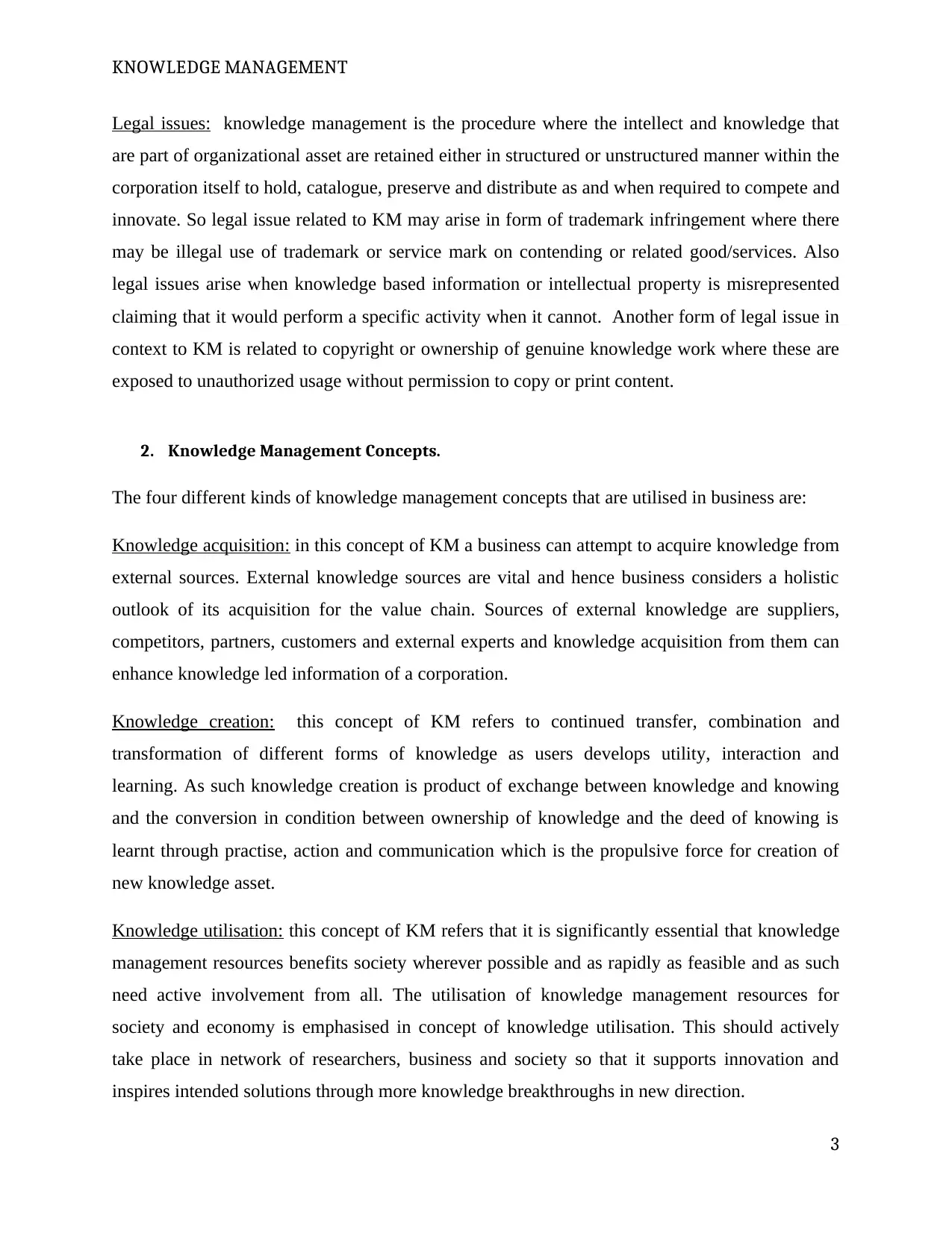
KNOWLEDGE MANAGEMENT
Legal issues: knowledge management is the procedure where the intellect and knowledge that
are part of organizational asset are retained either in structured or unstructured manner within the
corporation itself to hold, catalogue, preserve and distribute as and when required to compete and
innovate. So legal issue related to KM may arise in form of trademark infringement where there
may be illegal use of trademark or service mark on contending or related good/services. Also
legal issues arise when knowledge based information or intellectual property is misrepresented
claiming that it would perform a specific activity when it cannot. Another form of legal issue in
context to KM is related to copyright or ownership of genuine knowledge work where these are
exposed to unauthorized usage without permission to copy or print content.
2. Knowledge Management Concepts.
The four different kinds of knowledge management concepts that are utilised in business are:
Knowledge acquisition: in this concept of KM a business can attempt to acquire knowledge from
external sources. External knowledge sources are vital and hence business considers a holistic
outlook of its acquisition for the value chain. Sources of external knowledge are suppliers,
competitors, partners, customers and external experts and knowledge acquisition from them can
enhance knowledge led information of a corporation.
Knowledge creation: this concept of KM refers to continued transfer, combination and
transformation of different forms of knowledge as users develops utility, interaction and
learning. As such knowledge creation is product of exchange between knowledge and knowing
and the conversion in condition between ownership of knowledge and the deed of knowing is
learnt through practise, action and communication which is the propulsive force for creation of
new knowledge asset.
Knowledge utilisation: this concept of KM refers that it is significantly essential that knowledge
management resources benefits society wherever possible and as rapidly as feasible and as such
need active involvement from all. The utilisation of knowledge management resources for
society and economy is emphasised in concept of knowledge utilisation. This should actively
take place in network of researchers, business and society so that it supports innovation and
inspires intended solutions through more knowledge breakthroughs in new direction.
3
Legal issues: knowledge management is the procedure where the intellect and knowledge that
are part of organizational asset are retained either in structured or unstructured manner within the
corporation itself to hold, catalogue, preserve and distribute as and when required to compete and
innovate. So legal issue related to KM may arise in form of trademark infringement where there
may be illegal use of trademark or service mark on contending or related good/services. Also
legal issues arise when knowledge based information or intellectual property is misrepresented
claiming that it would perform a specific activity when it cannot. Another form of legal issue in
context to KM is related to copyright or ownership of genuine knowledge work where these are
exposed to unauthorized usage without permission to copy or print content.
2. Knowledge Management Concepts.
The four different kinds of knowledge management concepts that are utilised in business are:
Knowledge acquisition: in this concept of KM a business can attempt to acquire knowledge from
external sources. External knowledge sources are vital and hence business considers a holistic
outlook of its acquisition for the value chain. Sources of external knowledge are suppliers,
competitors, partners, customers and external experts and knowledge acquisition from them can
enhance knowledge led information of a corporation.
Knowledge creation: this concept of KM refers to continued transfer, combination and
transformation of different forms of knowledge as users develops utility, interaction and
learning. As such knowledge creation is product of exchange between knowledge and knowing
and the conversion in condition between ownership of knowledge and the deed of knowing is
learnt through practise, action and communication which is the propulsive force for creation of
new knowledge asset.
Knowledge utilisation: this concept of KM refers that it is significantly essential that knowledge
management resources benefits society wherever possible and as rapidly as feasible and as such
need active involvement from all. The utilisation of knowledge management resources for
society and economy is emphasised in concept of knowledge utilisation. This should actively
take place in network of researchers, business and society so that it supports innovation and
inspires intended solutions through more knowledge breakthroughs in new direction.
3
⊘ This is a preview!⊘
Do you want full access?
Subscribe today to unlock all pages.

Trusted by 1+ million students worldwide
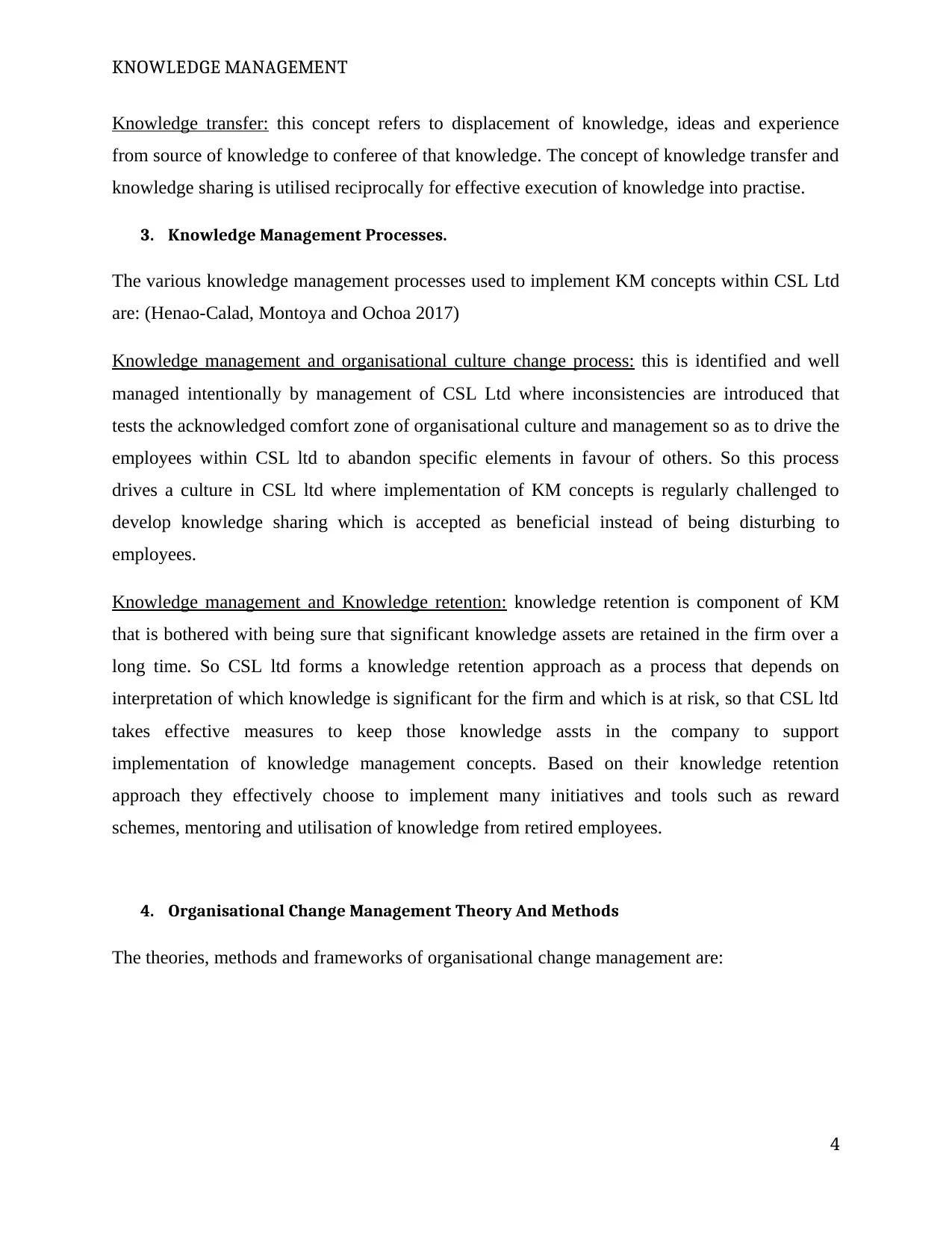
KNOWLEDGE MANAGEMENT
Knowledge transfer: this concept refers to displacement of knowledge, ideas and experience
from source of knowledge to conferee of that knowledge. The concept of knowledge transfer and
knowledge sharing is utilised reciprocally for effective execution of knowledge into practise.
3. Knowledge Management Processes.
The various knowledge management processes used to implement KM concepts within CSL Ltd
are: (Henao-Calad, Montoya and Ochoa 2017)
Knowledge management and organisational culture change process: this is identified and well
managed intentionally by management of CSL Ltd where inconsistencies are introduced that
tests the acknowledged comfort zone of organisational culture and management so as to drive the
employees within CSL ltd to abandon specific elements in favour of others. So this process
drives a culture in CSL ltd where implementation of KM concepts is regularly challenged to
develop knowledge sharing which is accepted as beneficial instead of being disturbing to
employees.
Knowledge management and Knowledge retention: knowledge retention is component of KM
that is bothered with being sure that significant knowledge assets are retained in the firm over a
long time. So CSL ltd forms a knowledge retention approach as a process that depends on
interpretation of which knowledge is significant for the firm and which is at risk, so that CSL ltd
takes effective measures to keep those knowledge assts in the company to support
implementation of knowledge management concepts. Based on their knowledge retention
approach they effectively choose to implement many initiatives and tools such as reward
schemes, mentoring and utilisation of knowledge from retired employees.
4. Organisational Change Management Theory And Methods
The theories, methods and frameworks of organisational change management are:
4
Knowledge transfer: this concept refers to displacement of knowledge, ideas and experience
from source of knowledge to conferee of that knowledge. The concept of knowledge transfer and
knowledge sharing is utilised reciprocally for effective execution of knowledge into practise.
3. Knowledge Management Processes.
The various knowledge management processes used to implement KM concepts within CSL Ltd
are: (Henao-Calad, Montoya and Ochoa 2017)
Knowledge management and organisational culture change process: this is identified and well
managed intentionally by management of CSL Ltd where inconsistencies are introduced that
tests the acknowledged comfort zone of organisational culture and management so as to drive the
employees within CSL ltd to abandon specific elements in favour of others. So this process
drives a culture in CSL ltd where implementation of KM concepts is regularly challenged to
develop knowledge sharing which is accepted as beneficial instead of being disturbing to
employees.
Knowledge management and Knowledge retention: knowledge retention is component of KM
that is bothered with being sure that significant knowledge assets are retained in the firm over a
long time. So CSL ltd forms a knowledge retention approach as a process that depends on
interpretation of which knowledge is significant for the firm and which is at risk, so that CSL ltd
takes effective measures to keep those knowledge assts in the company to support
implementation of knowledge management concepts. Based on their knowledge retention
approach they effectively choose to implement many initiatives and tools such as reward
schemes, mentoring and utilisation of knowledge from retired employees.
4. Organisational Change Management Theory And Methods
The theories, methods and frameworks of organisational change management are:
4
Paraphrase This Document
Need a fresh take? Get an instant paraphrase of this document with our AI Paraphraser
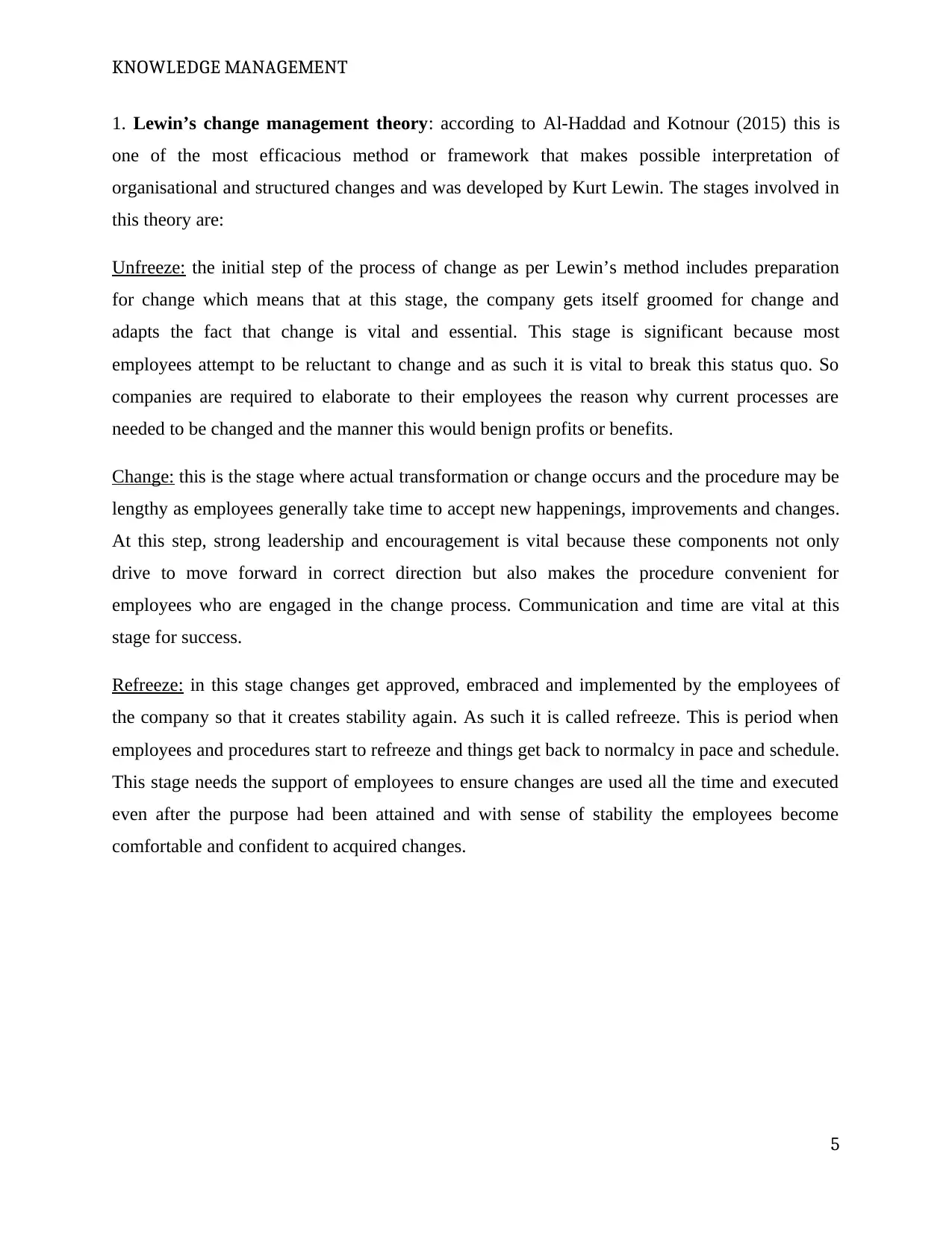
KNOWLEDGE MANAGEMENT
1. Lewin’s change management theory: according to Al-Haddad and Kotnour (2015) this is
one of the most efficacious method or framework that makes possible interpretation of
organisational and structured changes and was developed by Kurt Lewin. The stages involved in
this theory are:
Unfreeze: the initial step of the process of change as per Lewin’s method includes preparation
for change which means that at this stage, the company gets itself groomed for change and
adapts the fact that change is vital and essential. This stage is significant because most
employees attempt to be reluctant to change and as such it is vital to break this status quo. So
companies are required to elaborate to their employees the reason why current processes are
needed to be changed and the manner this would benign profits or benefits.
Change: this is the stage where actual transformation or change occurs and the procedure may be
lengthy as employees generally take time to accept new happenings, improvements and changes.
At this step, strong leadership and encouragement is vital because these components not only
drive to move forward in correct direction but also makes the procedure convenient for
employees who are engaged in the change process. Communication and time are vital at this
stage for success.
Refreeze: in this stage changes get approved, embraced and implemented by the employees of
the company so that it creates stability again. As such it is called refreeze. This is period when
employees and procedures start to refreeze and things get back to normalcy in pace and schedule.
This stage needs the support of employees to ensure changes are used all the time and executed
even after the purpose had been attained and with sense of stability the employees become
comfortable and confident to acquired changes.
5
1. Lewin’s change management theory: according to Al-Haddad and Kotnour (2015) this is
one of the most efficacious method or framework that makes possible interpretation of
organisational and structured changes and was developed by Kurt Lewin. The stages involved in
this theory are:
Unfreeze: the initial step of the process of change as per Lewin’s method includes preparation
for change which means that at this stage, the company gets itself groomed for change and
adapts the fact that change is vital and essential. This stage is significant because most
employees attempt to be reluctant to change and as such it is vital to break this status quo. So
companies are required to elaborate to their employees the reason why current processes are
needed to be changed and the manner this would benign profits or benefits.
Change: this is the stage where actual transformation or change occurs and the procedure may be
lengthy as employees generally take time to accept new happenings, improvements and changes.
At this step, strong leadership and encouragement is vital because these components not only
drive to move forward in correct direction but also makes the procedure convenient for
employees who are engaged in the change process. Communication and time are vital at this
stage for success.
Refreeze: in this stage changes get approved, embraced and implemented by the employees of
the company so that it creates stability again. As such it is called refreeze. This is period when
employees and procedures start to refreeze and things get back to normalcy in pace and schedule.
This stage needs the support of employees to ensure changes are used all the time and executed
even after the purpose had been attained and with sense of stability the employees become
comfortable and confident to acquired changes.
5
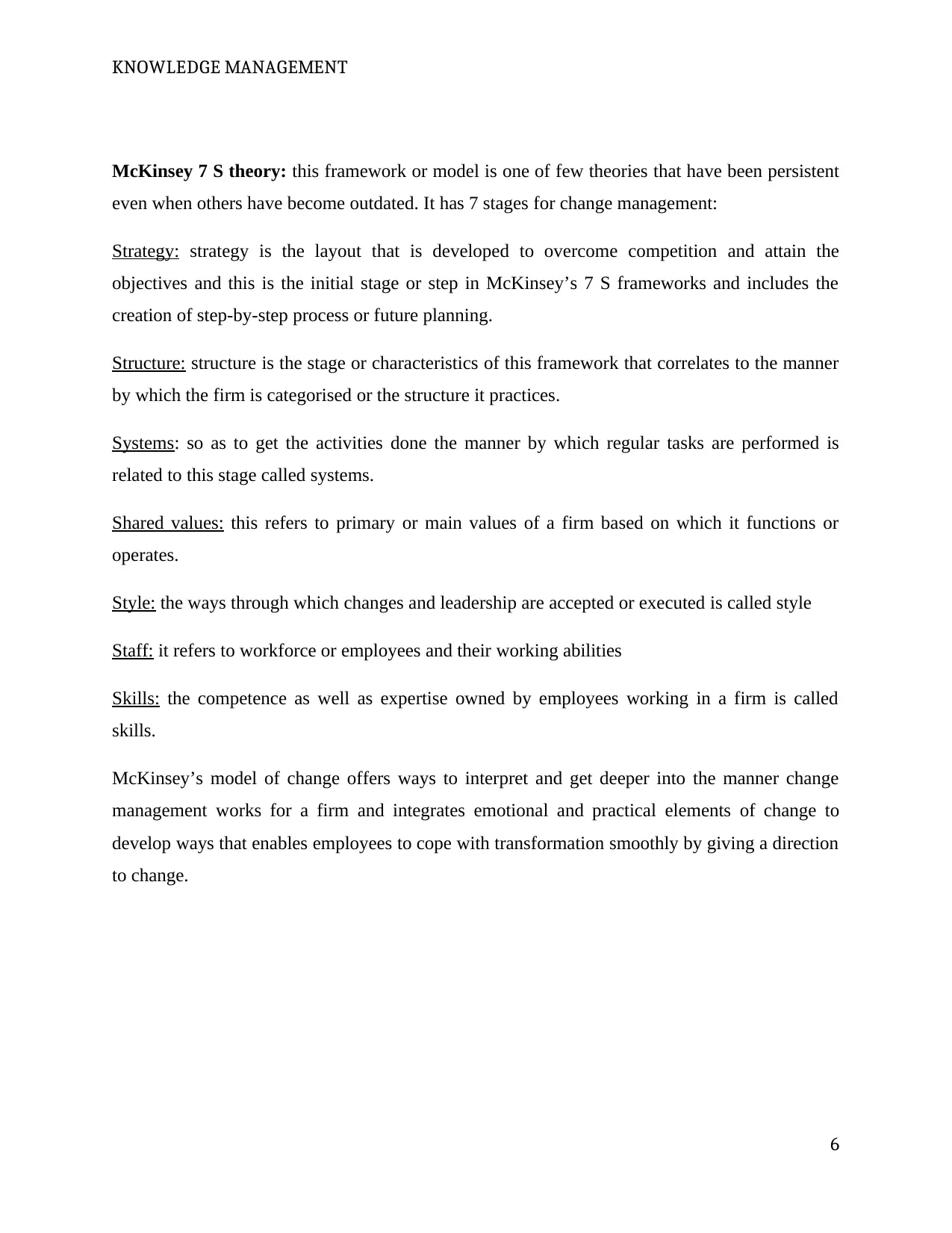
KNOWLEDGE MANAGEMENT
McKinsey 7 S theory: this framework or model is one of few theories that have been persistent
even when others have become outdated. It has 7 stages for change management:
Strategy: strategy is the layout that is developed to overcome competition and attain the
objectives and this is the initial stage or step in McKinsey’s 7 S frameworks and includes the
creation of step-by-step process or future planning.
Structure: structure is the stage or characteristics of this framework that correlates to the manner
by which the firm is categorised or the structure it practices.
Systems: so as to get the activities done the manner by which regular tasks are performed is
related to this stage called systems.
Shared values: this refers to primary or main values of a firm based on which it functions or
operates.
Style: the ways through which changes and leadership are accepted or executed is called style
Staff: it refers to workforce or employees and their working abilities
Skills: the competence as well as expertise owned by employees working in a firm is called
skills.
McKinsey’s model of change offers ways to interpret and get deeper into the manner change
management works for a firm and integrates emotional and practical elements of change to
develop ways that enables employees to cope with transformation smoothly by giving a direction
to change.
6
McKinsey 7 S theory: this framework or model is one of few theories that have been persistent
even when others have become outdated. It has 7 stages for change management:
Strategy: strategy is the layout that is developed to overcome competition and attain the
objectives and this is the initial stage or step in McKinsey’s 7 S frameworks and includes the
creation of step-by-step process or future planning.
Structure: structure is the stage or characteristics of this framework that correlates to the manner
by which the firm is categorised or the structure it practices.
Systems: so as to get the activities done the manner by which regular tasks are performed is
related to this stage called systems.
Shared values: this refers to primary or main values of a firm based on which it functions or
operates.
Style: the ways through which changes and leadership are accepted or executed is called style
Staff: it refers to workforce or employees and their working abilities
Skills: the competence as well as expertise owned by employees working in a firm is called
skills.
McKinsey’s model of change offers ways to interpret and get deeper into the manner change
management works for a firm and integrates emotional and practical elements of change to
develop ways that enables employees to cope with transformation smoothly by giving a direction
to change.
6
⊘ This is a preview!⊘
Do you want full access?
Subscribe today to unlock all pages.

Trusted by 1+ million students worldwide
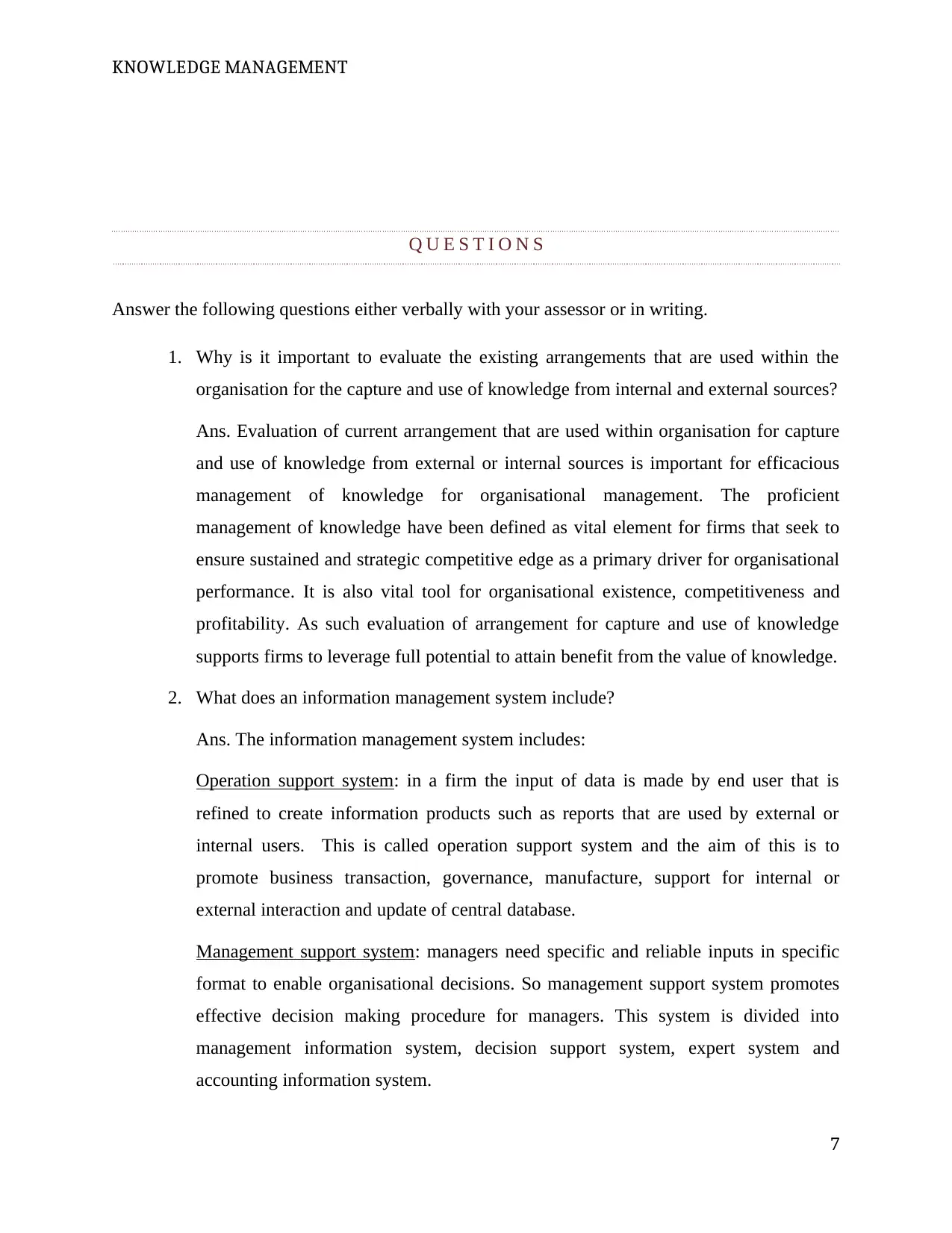
KNOWLEDGE MANAGEMENT
Q U E S T I O N S
Answer the following questions either verbally with your assessor or in writing.
1. Why is it important to evaluate the existing arrangements that are used within the
organisation for the capture and use of knowledge from internal and external sources?
Ans. Evaluation of current arrangement that are used within organisation for capture
and use of knowledge from external or internal sources is important for efficacious
management of knowledge for organisational management. The proficient
management of knowledge have been defined as vital element for firms that seek to
ensure sustained and strategic competitive edge as a primary driver for organisational
performance. It is also vital tool for organisational existence, competitiveness and
profitability. As such evaluation of arrangement for capture and use of knowledge
supports firms to leverage full potential to attain benefit from the value of knowledge.
2. What does an information management system include?
Ans. The information management system includes:
Operation support system: in a firm the input of data is made by end user that is
refined to create information products such as reports that are used by external or
internal users. This is called operation support system and the aim of this is to
promote business transaction, governance, manufacture, support for internal or
external interaction and update of central database.
Management support system: managers need specific and reliable inputs in specific
format to enable organisational decisions. So management support system promotes
effective decision making procedure for managers. This system is divided into
management information system, decision support system, expert system and
accounting information system.
7
Q U E S T I O N S
Answer the following questions either verbally with your assessor or in writing.
1. Why is it important to evaluate the existing arrangements that are used within the
organisation for the capture and use of knowledge from internal and external sources?
Ans. Evaluation of current arrangement that are used within organisation for capture
and use of knowledge from external or internal sources is important for efficacious
management of knowledge for organisational management. The proficient
management of knowledge have been defined as vital element for firms that seek to
ensure sustained and strategic competitive edge as a primary driver for organisational
performance. It is also vital tool for organisational existence, competitiveness and
profitability. As such evaluation of arrangement for capture and use of knowledge
supports firms to leverage full potential to attain benefit from the value of knowledge.
2. What does an information management system include?
Ans. The information management system includes:
Operation support system: in a firm the input of data is made by end user that is
refined to create information products such as reports that are used by external or
internal users. This is called operation support system and the aim of this is to
promote business transaction, governance, manufacture, support for internal or
external interaction and update of central database.
Management support system: managers need specific and reliable inputs in specific
format to enable organisational decisions. So management support system promotes
effective decision making procedure for managers. This system is divided into
management information system, decision support system, expert system and
accounting information system.
7
Paraphrase This Document
Need a fresh take? Get an instant paraphrase of this document with our AI Paraphraser
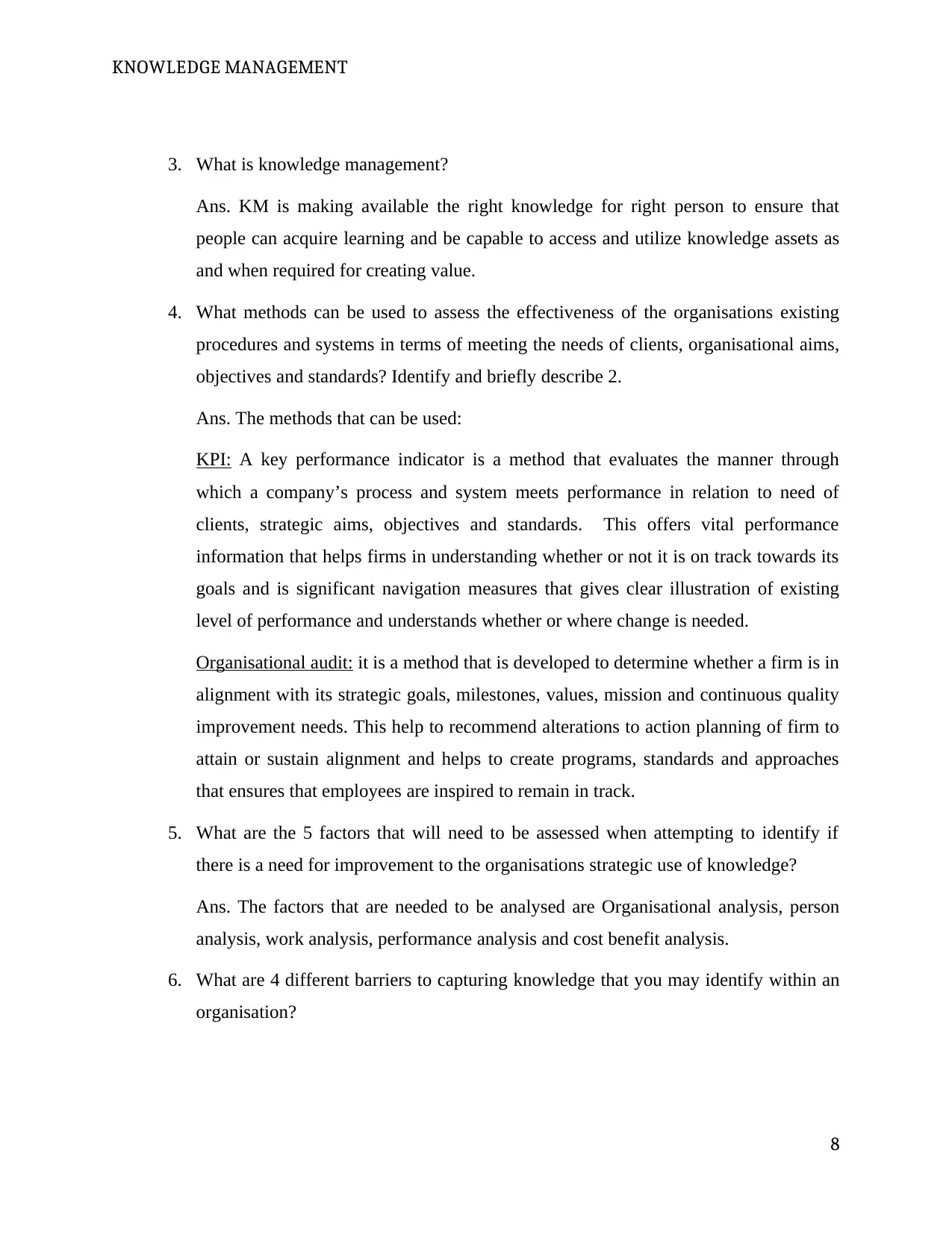
KNOWLEDGE MANAGEMENT
3. What is knowledge management?
Ans. KM is making available the right knowledge for right person to ensure that
people can acquire learning and be capable to access and utilize knowledge assets as
and when required for creating value.
4. What methods can be used to assess the effectiveness of the organisations existing
procedures and systems in terms of meeting the needs of clients, organisational aims,
objectives and standards? Identify and briefly describe 2.
Ans. The methods that can be used:
KPI: A key performance indicator is a method that evaluates the manner through
which a company’s process and system meets performance in relation to need of
clients, strategic aims, objectives and standards. This offers vital performance
information that helps firms in understanding whether or not it is on track towards its
goals and is significant navigation measures that gives clear illustration of existing
level of performance and understands whether or where change is needed.
Organisational audit: it is a method that is developed to determine whether a firm is in
alignment with its strategic goals, milestones, values, mission and continuous quality
improvement needs. This help to recommend alterations to action planning of firm to
attain or sustain alignment and helps to create programs, standards and approaches
that ensures that employees are inspired to remain in track.
5. What are the 5 factors that will need to be assessed when attempting to identify if
there is a need for improvement to the organisations strategic use of knowledge?
Ans. The factors that are needed to be analysed are Organisational analysis, person
analysis, work analysis, performance analysis and cost benefit analysis.
6. What are 4 different barriers to capturing knowledge that you may identify within an
organisation?
8
3. What is knowledge management?
Ans. KM is making available the right knowledge for right person to ensure that
people can acquire learning and be capable to access and utilize knowledge assets as
and when required for creating value.
4. What methods can be used to assess the effectiveness of the organisations existing
procedures and systems in terms of meeting the needs of clients, organisational aims,
objectives and standards? Identify and briefly describe 2.
Ans. The methods that can be used:
KPI: A key performance indicator is a method that evaluates the manner through
which a company’s process and system meets performance in relation to need of
clients, strategic aims, objectives and standards. This offers vital performance
information that helps firms in understanding whether or not it is on track towards its
goals and is significant navigation measures that gives clear illustration of existing
level of performance and understands whether or where change is needed.
Organisational audit: it is a method that is developed to determine whether a firm is in
alignment with its strategic goals, milestones, values, mission and continuous quality
improvement needs. This help to recommend alterations to action planning of firm to
attain or sustain alignment and helps to create programs, standards and approaches
that ensures that employees are inspired to remain in track.
5. What are the 5 factors that will need to be assessed when attempting to identify if
there is a need for improvement to the organisations strategic use of knowledge?
Ans. The factors that are needed to be analysed are Organisational analysis, person
analysis, work analysis, performance analysis and cost benefit analysis.
6. What are 4 different barriers to capturing knowledge that you may identify within an
organisation?
8
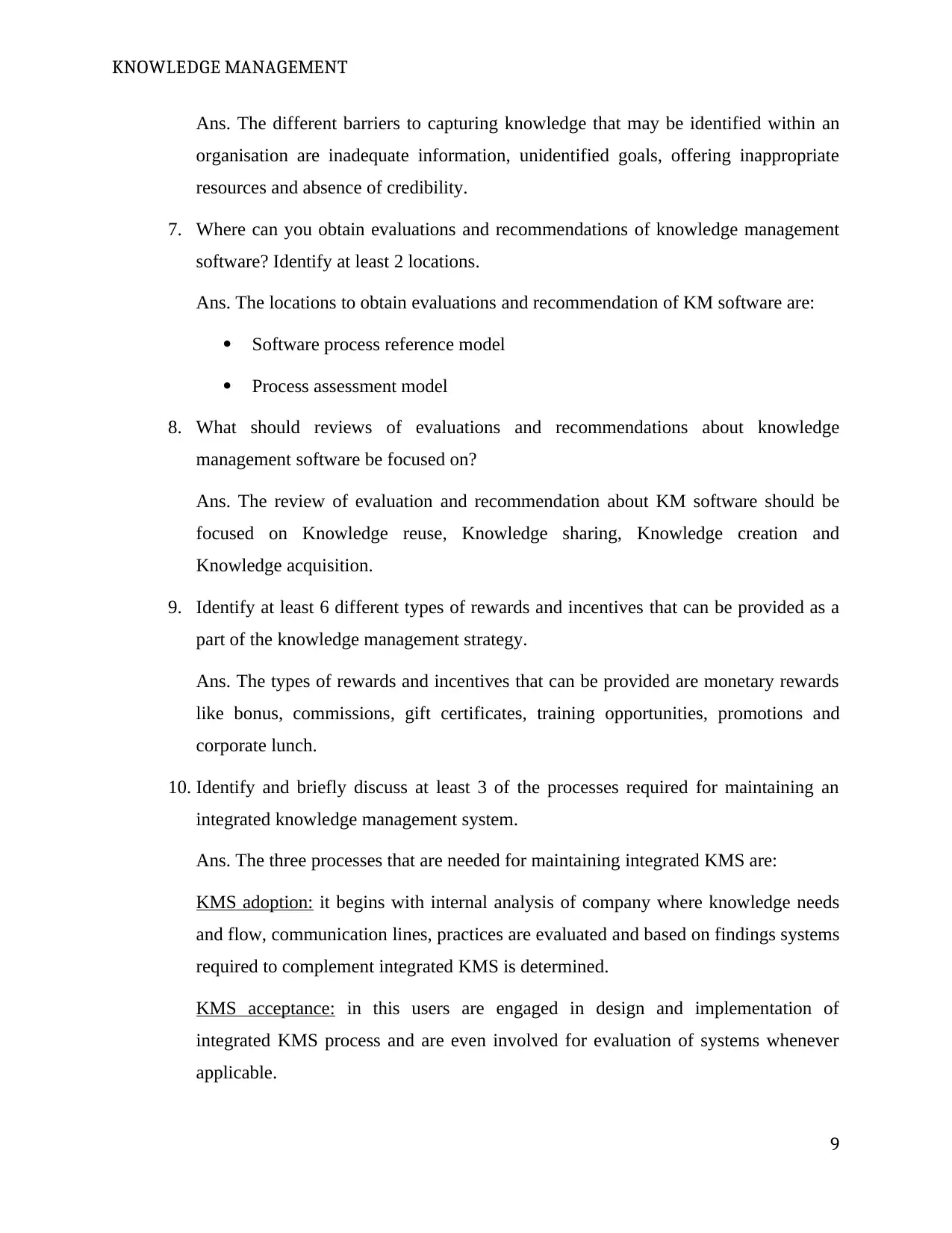
KNOWLEDGE MANAGEMENT
Ans. The different barriers to capturing knowledge that may be identified within an
organisation are inadequate information, unidentified goals, offering inappropriate
resources and absence of credibility.
7. Where can you obtain evaluations and recommendations of knowledge management
software? Identify at least 2 locations.
Ans. The locations to obtain evaluations and recommendation of KM software are:
Software process reference model
Process assessment model
8. What should reviews of evaluations and recommendations about knowledge
management software be focused on?
Ans. The review of evaluation and recommendation about KM software should be
focused on Knowledge reuse, Knowledge sharing, Knowledge creation and
Knowledge acquisition.
9. Identify at least 6 different types of rewards and incentives that can be provided as a
part of the knowledge management strategy.
Ans. The types of rewards and incentives that can be provided are monetary rewards
like bonus, commissions, gift certificates, training opportunities, promotions and
corporate lunch.
10. Identify and briefly discuss at least 3 of the processes required for maintaining an
integrated knowledge management system.
Ans. The three processes that are needed for maintaining integrated KMS are:
KMS adoption: it begins with internal analysis of company where knowledge needs
and flow, communication lines, practices are evaluated and based on findings systems
required to complement integrated KMS is determined.
KMS acceptance: in this users are engaged in design and implementation of
integrated KMS process and are even involved for evaluation of systems whenever
applicable.
9
Ans. The different barriers to capturing knowledge that may be identified within an
organisation are inadequate information, unidentified goals, offering inappropriate
resources and absence of credibility.
7. Where can you obtain evaluations and recommendations of knowledge management
software? Identify at least 2 locations.
Ans. The locations to obtain evaluations and recommendation of KM software are:
Software process reference model
Process assessment model
8. What should reviews of evaluations and recommendations about knowledge
management software be focused on?
Ans. The review of evaluation and recommendation about KM software should be
focused on Knowledge reuse, Knowledge sharing, Knowledge creation and
Knowledge acquisition.
9. Identify at least 6 different types of rewards and incentives that can be provided as a
part of the knowledge management strategy.
Ans. The types of rewards and incentives that can be provided are monetary rewards
like bonus, commissions, gift certificates, training opportunities, promotions and
corporate lunch.
10. Identify and briefly discuss at least 3 of the processes required for maintaining an
integrated knowledge management system.
Ans. The three processes that are needed for maintaining integrated KMS are:
KMS adoption: it begins with internal analysis of company where knowledge needs
and flow, communication lines, practices are evaluated and based on findings systems
required to complement integrated KMS is determined.
KMS acceptance: in this users are engaged in design and implementation of
integrated KMS process and are even involved for evaluation of systems whenever
applicable.
9
⊘ This is a preview!⊘
Do you want full access?
Subscribe today to unlock all pages.

Trusted by 1+ million students worldwide
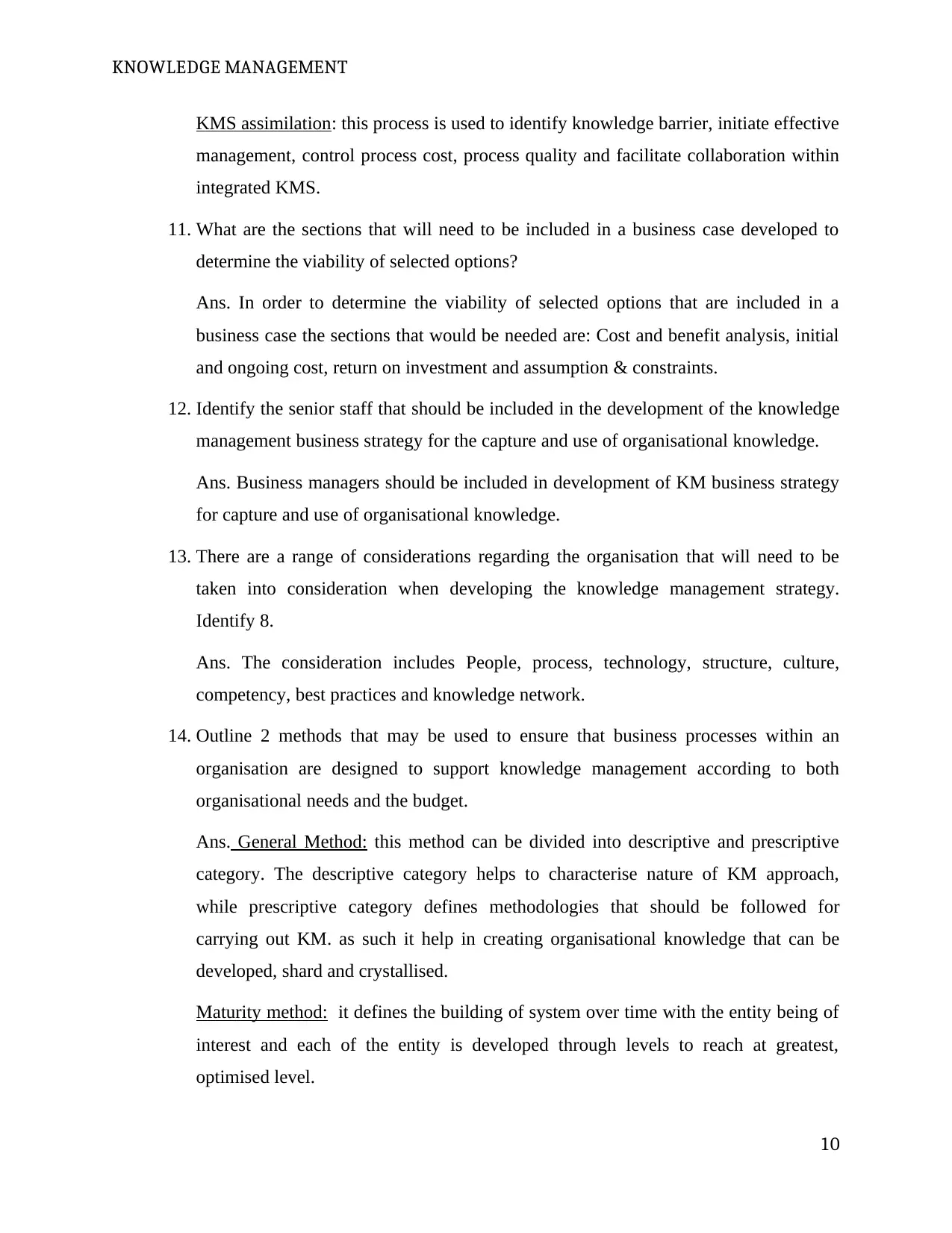
KNOWLEDGE MANAGEMENT
KMS assimilation: this process is used to identify knowledge barrier, initiate effective
management, control process cost, process quality and facilitate collaboration within
integrated KMS.
11. What are the sections that will need to be included in a business case developed to
determine the viability of selected options?
Ans. In order to determine the viability of selected options that are included in a
business case the sections that would be needed are: Cost and benefit analysis, initial
and ongoing cost, return on investment and assumption & constraints.
12. Identify the senior staff that should be included in the development of the knowledge
management business strategy for the capture and use of organisational knowledge.
Ans. Business managers should be included in development of KM business strategy
for capture and use of organisational knowledge.
13. There are a range of considerations regarding the organisation that will need to be
taken into consideration when developing the knowledge management strategy.
Identify 8.
Ans. The consideration includes People, process, technology, structure, culture,
competency, best practices and knowledge network.
14. Outline 2 methods that may be used to ensure that business processes within an
organisation are designed to support knowledge management according to both
organisational needs and the budget.
Ans. General Method: this method can be divided into descriptive and prescriptive
category. The descriptive category helps to characterise nature of KM approach,
while prescriptive category defines methodologies that should be followed for
carrying out KM. as such it help in creating organisational knowledge that can be
developed, shard and crystallised.
Maturity method: it defines the building of system over time with the entity being of
interest and each of the entity is developed through levels to reach at greatest,
optimised level.
10
KMS assimilation: this process is used to identify knowledge barrier, initiate effective
management, control process cost, process quality and facilitate collaboration within
integrated KMS.
11. What are the sections that will need to be included in a business case developed to
determine the viability of selected options?
Ans. In order to determine the viability of selected options that are included in a
business case the sections that would be needed are: Cost and benefit analysis, initial
and ongoing cost, return on investment and assumption & constraints.
12. Identify the senior staff that should be included in the development of the knowledge
management business strategy for the capture and use of organisational knowledge.
Ans. Business managers should be included in development of KM business strategy
for capture and use of organisational knowledge.
13. There are a range of considerations regarding the organisation that will need to be
taken into consideration when developing the knowledge management strategy.
Identify 8.
Ans. The consideration includes People, process, technology, structure, culture,
competency, best practices and knowledge network.
14. Outline 2 methods that may be used to ensure that business processes within an
organisation are designed to support knowledge management according to both
organisational needs and the budget.
Ans. General Method: this method can be divided into descriptive and prescriptive
category. The descriptive category helps to characterise nature of KM approach,
while prescriptive category defines methodologies that should be followed for
carrying out KM. as such it help in creating organisational knowledge that can be
developed, shard and crystallised.
Maturity method: it defines the building of system over time with the entity being of
interest and each of the entity is developed through levels to reach at greatest,
optimised level.
10
Paraphrase This Document
Need a fresh take? Get an instant paraphrase of this document with our AI Paraphraser
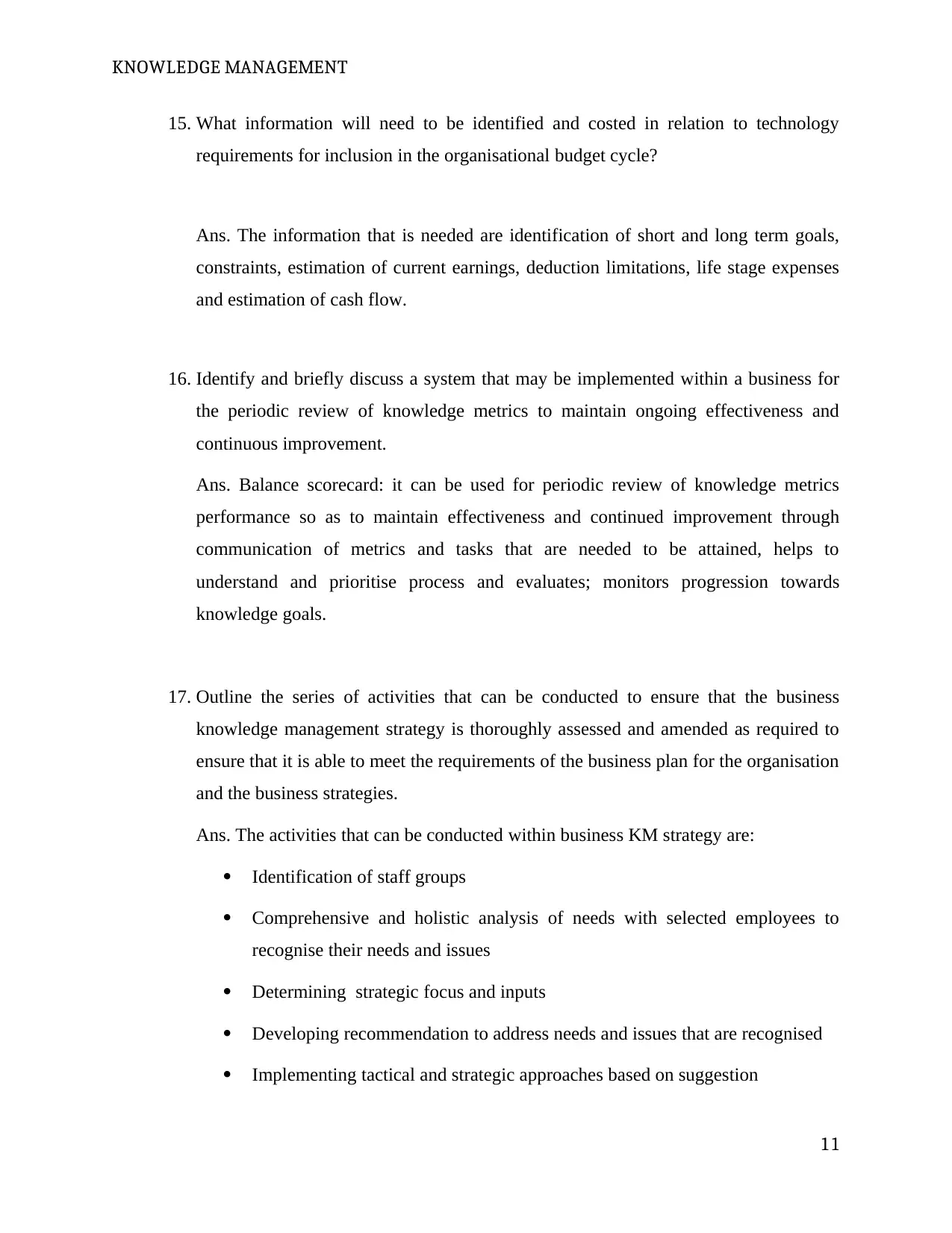
KNOWLEDGE MANAGEMENT
15. What information will need to be identified and costed in relation to technology
requirements for inclusion in the organisational budget cycle?
Ans. The information that is needed are identification of short and long term goals,
constraints, estimation of current earnings, deduction limitations, life stage expenses
and estimation of cash flow.
16. Identify and briefly discuss a system that may be implemented within a business for
the periodic review of knowledge metrics to maintain ongoing effectiveness and
continuous improvement.
Ans. Balance scorecard: it can be used for periodic review of knowledge metrics
performance so as to maintain effectiveness and continued improvement through
communication of metrics and tasks that are needed to be attained, helps to
understand and prioritise process and evaluates; monitors progression towards
knowledge goals.
17. Outline the series of activities that can be conducted to ensure that the business
knowledge management strategy is thoroughly assessed and amended as required to
ensure that it is able to meet the requirements of the business plan for the organisation
and the business strategies.
Ans. The activities that can be conducted within business KM strategy are:
Identification of staff groups
Comprehensive and holistic analysis of needs with selected employees to
recognise their needs and issues
Determining strategic focus and inputs
Developing recommendation to address needs and issues that are recognised
Implementing tactical and strategic approaches based on suggestion
11
15. What information will need to be identified and costed in relation to technology
requirements for inclusion in the organisational budget cycle?
Ans. The information that is needed are identification of short and long term goals,
constraints, estimation of current earnings, deduction limitations, life stage expenses
and estimation of cash flow.
16. Identify and briefly discuss a system that may be implemented within a business for
the periodic review of knowledge metrics to maintain ongoing effectiveness and
continuous improvement.
Ans. Balance scorecard: it can be used for periodic review of knowledge metrics
performance so as to maintain effectiveness and continued improvement through
communication of metrics and tasks that are needed to be attained, helps to
understand and prioritise process and evaluates; monitors progression towards
knowledge goals.
17. Outline the series of activities that can be conducted to ensure that the business
knowledge management strategy is thoroughly assessed and amended as required to
ensure that it is able to meet the requirements of the business plan for the organisation
and the business strategies.
Ans. The activities that can be conducted within business KM strategy are:
Identification of staff groups
Comprehensive and holistic analysis of needs with selected employees to
recognise their needs and issues
Determining strategic focus and inputs
Developing recommendation to address needs and issues that are recognised
Implementing tactical and strategic approaches based on suggestion
11
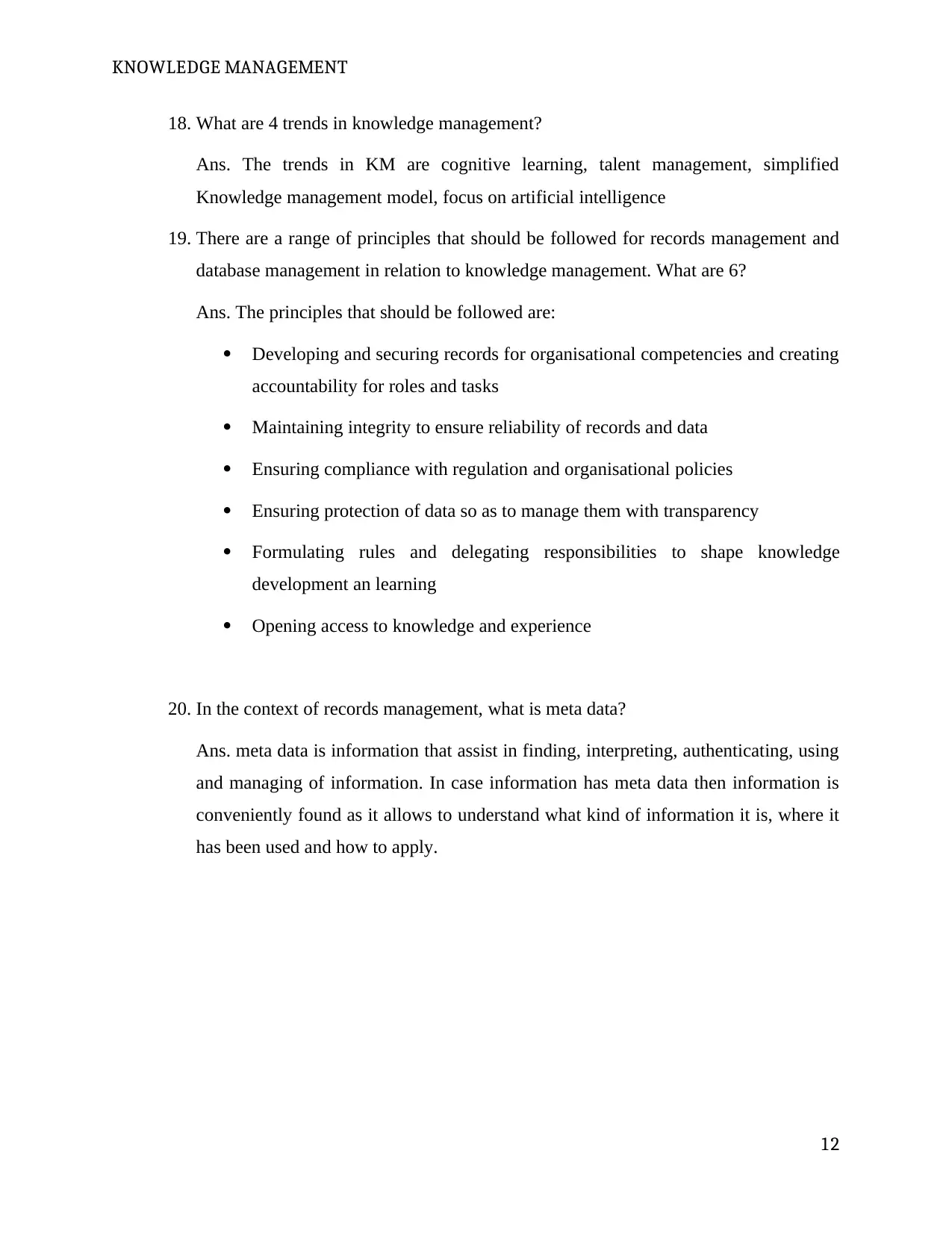
KNOWLEDGE MANAGEMENT
18. What are 4 trends in knowledge management?
Ans. The trends in KM are cognitive learning, talent management, simplified
Knowledge management model, focus on artificial intelligence
19. There are a range of principles that should be followed for records management and
database management in relation to knowledge management. What are 6?
Ans. The principles that should be followed are:
Developing and securing records for organisational competencies and creating
accountability for roles and tasks
Maintaining integrity to ensure reliability of records and data
Ensuring compliance with regulation and organisational policies
Ensuring protection of data so as to manage them with transparency
Formulating rules and delegating responsibilities to shape knowledge
development an learning
Opening access to knowledge and experience
20. In the context of records management, what is meta data?
Ans. meta data is information that assist in finding, interpreting, authenticating, using
and managing of information. In case information has meta data then information is
conveniently found as it allows to understand what kind of information it is, where it
has been used and how to apply.
12
18. What are 4 trends in knowledge management?
Ans. The trends in KM are cognitive learning, talent management, simplified
Knowledge management model, focus on artificial intelligence
19. There are a range of principles that should be followed for records management and
database management in relation to knowledge management. What are 6?
Ans. The principles that should be followed are:
Developing and securing records for organisational competencies and creating
accountability for roles and tasks
Maintaining integrity to ensure reliability of records and data
Ensuring compliance with regulation and organisational policies
Ensuring protection of data so as to manage them with transparency
Formulating rules and delegating responsibilities to shape knowledge
development an learning
Opening access to knowledge and experience
20. In the context of records management, what is meta data?
Ans. meta data is information that assist in finding, interpreting, authenticating, using
and managing of information. In case information has meta data then information is
conveniently found as it allows to understand what kind of information it is, where it
has been used and how to apply.
12
⊘ This is a preview!⊘
Do you want full access?
Subscribe today to unlock all pages.

Trusted by 1+ million students worldwide
1 out of 13
Related Documents
Your All-in-One AI-Powered Toolkit for Academic Success.
+13062052269
info@desklib.com
Available 24*7 on WhatsApp / Email
![[object Object]](/_next/static/media/star-bottom.7253800d.svg)
Unlock your academic potential
Copyright © 2020–2026 A2Z Services. All Rights Reserved. Developed and managed by ZUCOL.





